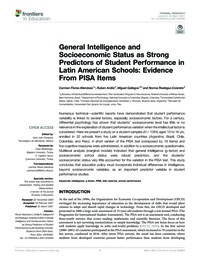General intelligence and socioeconomic status as strong predictors of student performance in latin american schools: Evidence from pisa items
Autor
Flores-Mendoza, Carmen
Ardila, Rubén
Gallegos, Miguel
Reategui-Colareta, Norma
Fecha
2021Resumen
Numerous technical—scientific reports have demonstrated that student performance variability is linked to several factors, especially socioeconomic factors. For a century, differential psychology has shown that students’ socioeconomic level has little or no relevance in the explanation of student performance variation when the intellectual factor is considered. Here we present a study on a student samples (N = 1264) aged 13 to 16 yrs, enrolled in 32 schools from five Latin American countries (Argentina, Brazil, Chile, Colombia, and Peru). A short version of the PISA test (composed by 16 items) and five cognitive measures were administered, in addition to a socioeconomic questionnaire. Multilevel analysis (marginal models) indicated that general intelligence (g-factor) and socioeconomic school status were robust predictors, and the students’ socioeconomic status very little accounted for the variation in the PISA test. This study concludes that education policy must incorporate individual differences in intelligence, beyond socioeconomic variables, as an important predictor variable in student performance studies.
Fuente
Frontiers in Education, 6, 632289Link de Acceso
Click aquí para ver el documentoIdentificador DOI
doi.org/10.3389/feduc.2021.632289Colecciones
La publicación tiene asociados los siguientes ficheros de licencia:


